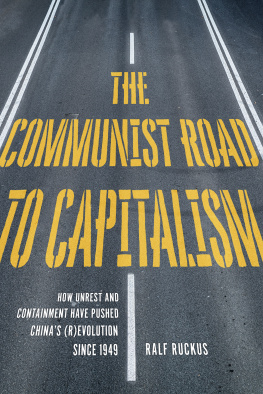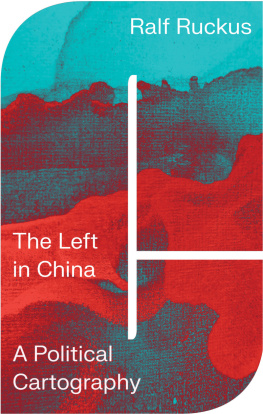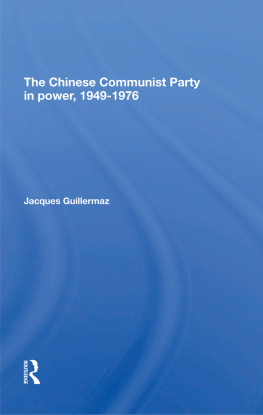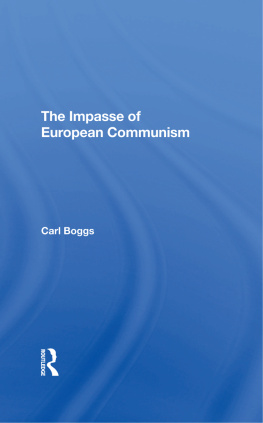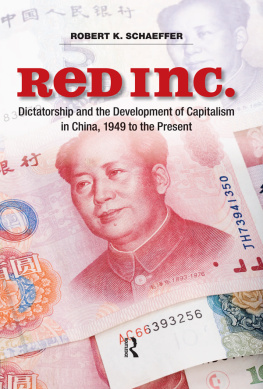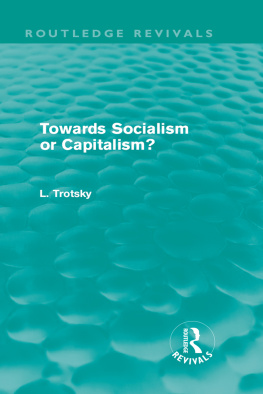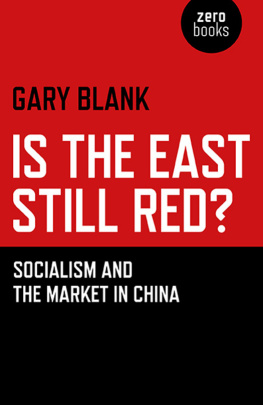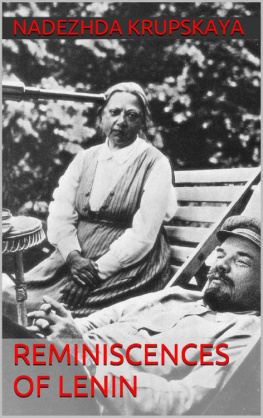Contents
Page List
Guide
The global left is terribly confused about China. Thankfully, Ralf Ruckus has responded powerfully to this problem, one that has been made all the more urgent by Chinas increasingly global ambitions and the attendant intensified imperial rivalry with the US and its allies. Undertaking a thorough and systematic analysis of evolving political, social, and economic dynamics, he reveals how Chinas failed experiment with socialism laid the groundwork for its more recent explosive capitalist growth. But he also shows that the transition to capitalism was neither inevitable nor its victory final. Highly recommended!
Eli Friedman, professor of international and comparative labor at Cornell University and author of Insurgency Trap: Labor Politics in Postsocialist China (ILR Press, 2014)
What we in the Western world take for granted and consumeclothes, computers, watches, mobile phones, etc.depends largely on work and workers in todays China. Yet work and workers in China have been almost invisible on both sides of the Atlantic over the years. This book opens a window on the times and circumstances that ordinary women and men in China have gone through since the late 1940s. Ralf Ruckus unfolds a story of advances, defeats, repressions, and revolts for better standards of living, individual and collective rights, freedom of expression and residence, and dignity. This book will be indispensable to those who are not satisfied with grand geopolitical overviews about China, and who want to look closely at the Peoples Republic of Chinas past and current trends.
Ferruccio Gambino, veteran Italian activist, coeditor of the journal altre ragioni, and lecturer on international migration at the University of Padua
It is striking, with everything that has been written about contemporary China, how few works put the Chinese working class, in reality the key to Chinas situation, front and center. Ralf Ruckuss book is an excellent corrective to this lack. The Chinese working class, by its location in the worlds workshop, will shake the world, as the Russian working class did in 1917, hopefully with a happier outcome.
Loren Goldner, coeditor of Insurgent Notes
This highly original book traverses a range of contexts and will appeal to readers interested in the nature and meaning of the transition from socialism to capitalism in China. Of interest to both China experts and leftist activists, this timely book will help readers better understand both the complex history of the Communist Party of China and the contemporary nature of class struggle. Innovative in method and surprising in its findings, this superb book will prove to be a landmark work in advancing the field of Chinese labor history.
Andrej Grubaic, professor of anthropology at CIIS-San Francisco and coauthor, with Denis OHearn, of Living at the Edges of Capitalism (University of California Press, 2016) and, with Staughton Lynd, of Wobblies and Zapatistas (PM Press, 2008)
While there is renewed interest in socialism the world over, there seems to be a consensus that socialism has not yet been realized. Even if this is true, it is curious how little time the socialist left spends studying movements that claim to clear the path toward it. This is why The Communist Road to Capitalism is essential reading. Authored by a seasoned labor activist and scholar whose knowledge about working-class struggles in China is second to none, this book helps us answer some of the crucial questions of our time: Is there a way to socialism? Have we advanced on it? How do we reach its end?
Gabriel Kuhn, author of Antifascism, Sports, Sobriety: Forging a Militant Working-Class Culture (PM Press, 2017)
THE COMMUNIST ROAD TO CAPITALISM
How Social Unrest and Containment Have Pushed Chinas (R)evolution since 1949
Ralf Ruckus

The Communist Road to Capitalism: How Social Unrest and Containment Have Pushed Chinas (R)evolution since 1949
Ralf Ruckus
This edition 2021 PM Press
All rights reserved. Except for brief quotations in critical publications or reviews, no part of this book may be reproduced, used, or stored in any information retrieval system, or transmitted in any form or by any means, electronic, mechanical, photocopying, recording, or otherwise in any manner without prior written permission from the publisher.
ISBN: 9781629638379 (print)
ISBN: 9781629638539 (ebook)
Library of Congress Control Number: 2020934749
Cover by John Yates / www.stealworks.com
Interior design by briandesign
10 9 8 7 6 5 4 3 2 1
PM Press
PO Box 23912
Oakland, CA 94623
www.pmpress.org
Printed in the USA.
This book is dedicated to Ruda.
CONTENTS
PREFACE
Once upon a time a young man set out to write the definitive book on China. He prepared himself by studying all that had been written on the subject. He learned the language. His head almost burst with ideas. Finally the book was done except for the transcription of his mental shorthand. He only needed a few minor statistics on some unimportant point. Well, said the young man to himself as he read over his outline, one days delay wont make much difference; I might as well get those figures tomorrow so that I wont have to interrupt my writing later on. That was forty-six years ago; last heard of the young mannow a very old manwas still looking up a few minor details and figures.
Peter F. Drucker
In 2013, Ramsey Kanaan of PM Press suggested I publish a book on Chinas political economy. At the time, I had already spent roughly a decade closely examining the trajectory of the Peoples Republic of China (PRC). Much of the political exchange, writing, translation, and intervention I had been involved in dealt with contemporary class politicsmigration, gender relations, and workplace conflicts. I focused mainly on the experiences from below of discontented workers, rebellious women*, Writing a comprehensive historical account of the PRCs political economy since 1949 from such a grassroots perspective sounded challenging and interestingand like a lot of work. In the following months and years, I collected material on different phases of PRC history, wrote a couple of book reviews related to topics I intended to address in the book, and drafted concepts and chapters. Yet along the way, I repeatedly got distracted by other PRC-related publishing projects and my involvement in political debates and social struggles in the PRC, Poland, and Germany. Sometimes I felt like the young man who was getting old while still looking for a few minor details, as well as the time and opportunity to finish the book. Now it is finally donea critical historiography of PRC class politics spanning the last seventy years.
I wrote the book as an independent left-wing activist and researcher. I dont work for an academic institution or a private enterprise, so I do not have to hold back opinions that might be unacceptable for state or private employers, nor am I restricted by academic fashions, competition, or credit counting, which often lead to twisted, repetitive, and politically dubious academic literature. Without these restrictions, I could employ the analytical methods and tools I have learned in social struggles and political debates in Western Europe, Eastern Europe, North America, and East Asia during the past decades. For the historical research, I primarily used literature in English, complemented by some in German, Chinese, and other languages. Interviews and exchanges with workers, students, academics, and left-wing activists, many of them from the PRC, helped me cover more recent events. Even if their insights and analyses feed into a many of the arguments presented here, the book still represents my outsider view of this history, as I did not grow up in the PRC, nor have I settled there.

